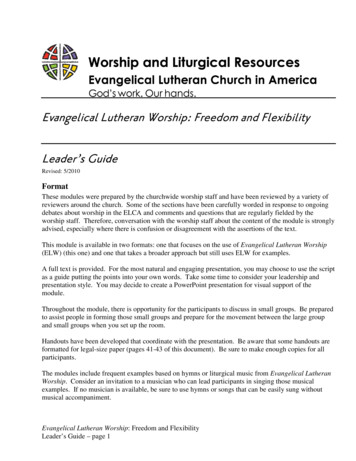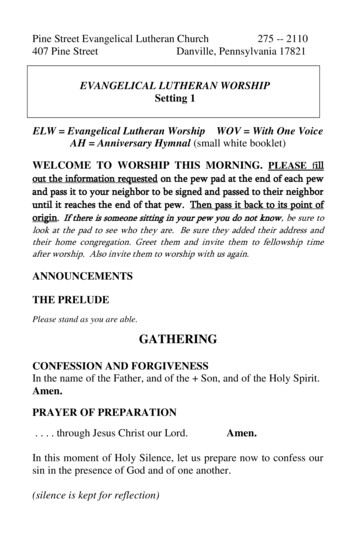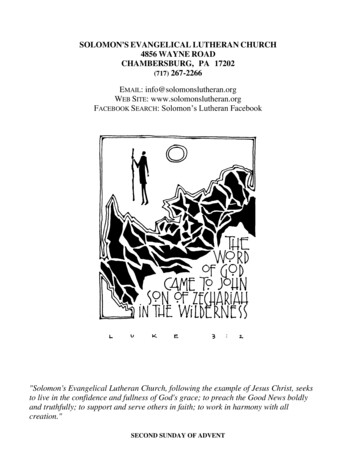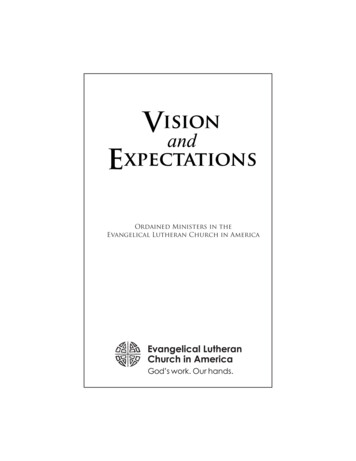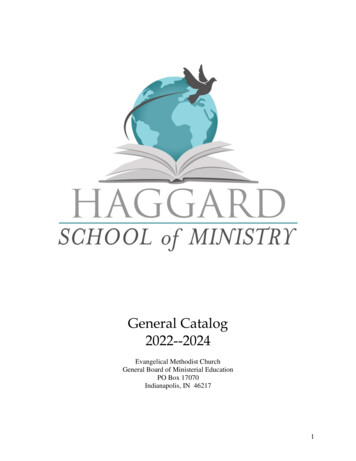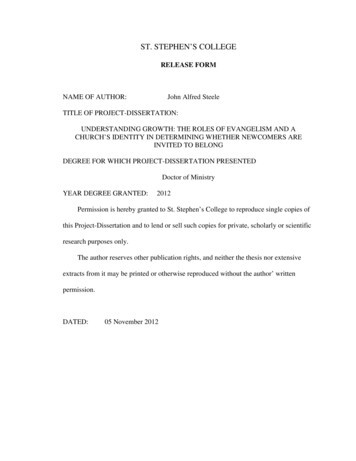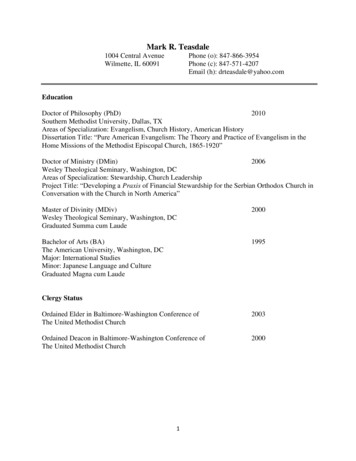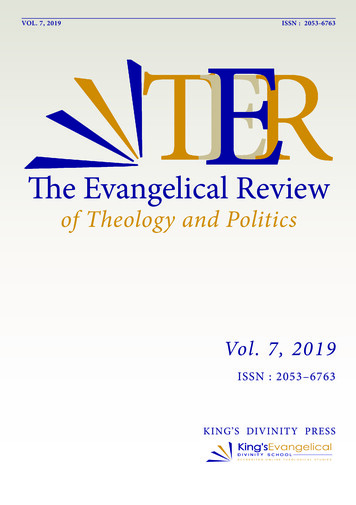
Transcription
VOL. 7, 2019ISSN : 2053-6763The Evangelical Reviewof Theology and PoliticsVol. 7, 2019ISSN : 2053–6763KING’S DIVINIT Y PRESS
The Evangelical Reviewof Theology and Politicsw w w.evangelicalreview.com
w w w. e v a n g e l i c a l r e v i e w. c o mThe Evangelical Review of Theology and PoliticsISSN: 2053-6763Copyright 2019 King’s Divinity Press.All material is copyright protected and may not be reproduced, stored ortransmitted without written permission (except where a licence exists to do so).Typesetting :: Ash Design (UK)Minion Pro 10.5pt on 14.5pt
The Evangelical Reviewof Theology and PoliticsVolume 72019Edited byCalvin L. SmithStephen M. VantasselKing’s Divinity Press( a d i v i s i o n o f K i n g ’ s Eva n g e l i c a l D i v i n i t y S c h o o l )United Kingdom
Core ValuesThe Evangelical Review of Theology and Politics subscribes to the historic decisions of theearly church councils. We hold dearly to the deity of Christ, the virgin conception, salvationthrough Jesus Christ, and the Trinity. We also believe in the unity of Scripture and considerthe Bible as the final authority on all issues of faith and practice. This high view of Scripturerequires submissions to be underpinned by a thoughtful biblical and theological analysis.The Editors also welcome non-Evangelical contributors to submit critiques of Evangelicalpolitical and social thought, providing they are suitably respectful of our values and beliefs,and that submissions are of interest and relevance to the aims and readership of the journal.Articles appearing in the journal do not necessarily reflect the views of the Editors.EditorsDr Calvin L. Smith, King’sEvangelical Divinity School, U.K.Consulting EditorsDr Mark R. Amstutz, Wheaton College, USADr. P.H. Brazier, Wimbledon, London, UK.Dr Stephen Vantassel, King’sEvangelical Divinity School,U.K., and, University of Nebraska(Lincoln), U.S.A.Dr Jonathan Chaplin, Kirby Laing Institute forChristian Ethics, EnglandBook Reviews EditorDr Brian Edgar, Asbury Theological Seminary, USADr David Cowan, University of St Andrew’s andKing’s Evangelical Divinity SchoolTimothy Lim T. N., RegentUniversity (Virginia, U.S.A.) andKing’s Evangelical Divinity School(U.K.)Dr Paul Freston, Institute for Studies of Religion,Baylor University, USADesign, Web, and ProductionManagerRevd Dr David Smith, International ChristianCollege, ScotlandP.H. Brazier (Ash Design),Wimbledon London, U.K.Dr Michael Vlach, The Master’s Seminary, USADr Douglas Petersen, Vanguard University, USADr Timothy R.A. Sherratt, Gordon College, USADr Daniel Strange, Oak Hill College, EnglandThe Evangelical Review of Theology and Politics is an online journal. All articles and reviewsare published online as PDF files, and are downloadable by subscribers. All articles andreviews are published in real time. Once peer reviewed and typeset they are immediatelypublished online and the subscribers notified by email. This takes the place of a printedjournal. Subscribers can print-off articles and bind them in a folder for future reference.This means there is no delay between acceptance and publication of an article: the materialbecomes available immediately to the academic and Church communities. Periodically aselection of the articles/essays is published in book form. For subscriptions and submissionguidelines and further information concerning the journal visit www.evangelicalreview.com and download our style sheet. Consideration begins immediately upon receipt.AbstractsThis journal is abstracted in Religious and Theological Abstracts, 100 West Park Ave (Box215), Myerstown PA 17067, USA. http://rtabstracts.orgw w w.evangelicalreview.com
ContentsContributorsIntroductionCalvin L. SmithixxiiiArticlesDavid Muthukumar S.History as Revelation and Divine Discourse in History:A Postfoundationalist Anchoring of Scriptural Authority3Jongseock ShinThe Church as a Messianic Fellowship in Jürgen Moltmann’s and WolfhartPannenberg’s Public Ecclesiology: Constructing a Holistic and ParticipatoryPneumatology and Ecclesiology39P. H. Brazier“The Tree lies where it Falls:”A Simpsons’ Eschatology—Towards a Lewisian Understandingof Eternal Life and Human RebellionRobb Torseth‘Bereft of the Soul’:Biblical and Augustinian Views of Death as they pertain to Measuringthe Existential Threat of Transhumanist Anthropological Destiny65117
viContentsReview ArticlesViktor J TóthMultidimensional Monism: Veli-Matti Kärkäinen’s Proposal fora New Theological Anthropology141Book ReviewsKarl Barth.A Unique Time of God: Karl Barth’s WWI Sermons.Translated and edited by William Klempa.Reviewed by, Daniel L. Stevenson, Jr.163Tommy Givens.We the People: Israel and the Catholicity of JesusReviewed by, Esteban Miranda166David ElliotHope and Christian Ethics (New Studies in Christian Ethics)Reviewed by, Agnes Chiu, Ph.D172Barna Group,Barna Trends 2018:What’s New and What’s Next at the Intersection of Faith and Culture.Reviewed by, Joyce del Rosario177Mattison III, William C.The Sermon on the Mount and Moral Theology: A Virtue Perspective.Reviewed by, Stephen M.Vantassel181P. Travis Kroeker.Messianic Political Theology and Diaspora Ethics: Essays in Exile.Reviewed by, Aaron Perry184William Willimon.Who Lynched Willie Earle?: Preaching to Confront RacismReviewed by, Daniel L. Stevenson, Jr.188
ContentsviiIan Christopher Levy.Introducing Medieval Biblical Interpretation:The Senses of Scripture in Premodern Exegesis.Reviewed by, Emily Buck. Fuller191Love L Sechrest, Johnny Ramirez-Johnson, Amos Yong (eds).Can White People Be Saved? Triangulating Race,Theology, and Mission (Missiological Engagements)Reviewed by, Dr. Craig Hendrickson195Robert Louis Wilken.Liberty in the Things of God:The Christian Origins of Religious FreedomReviewed by Brendon Michael Norton200Keith D. Stanglin.The Letter and Spirit of Biblical Interpretation:From the Early Church to Modern Practice.Reviewed by, Emily Buck204J. P. Moreland.Scientism and Secularism:Learning to Respond to a Dangerous IdeologyReviewed by, Kenneth R. Marple207Thomas R. Schreiner.Spiritual Gifts: What they are & why they matterReviewed by, Mark Anderson211Notes217Back Cover222
ContributorsAuthors/contributors are arranged according to their date of publicationon The Evangelical Review website.ArticlesRevd Dn. David Muthukumar S.The author is a PhD Candidate (Systematic Theology) at FullerTheological Seminary, California. He is from India and is interested inthe systematic articulation of the uniqueness of Christ in the context ofIndian religious diversity, especially in dialogue with Hindu faith. Heis ordained as a Deacon in the Church of North India (CNI) MumbaiDiocese.(Published May 6, 2019)Jongseock ShinJongseock Shin is a PhD candidate at Fuller Theological Seminary. Heis currently working on his dissertation on the topic of natural andcosmic theodicy and creative/redemptive divine action in a Trinitarianpanentheistic framework of creation. This study is interdisciplinary as itseeks to present a mutually fruitful dialogue between natural science andtheology.(Published June 20, 2019)
xContributorsP. H. BrazierPaul Brazier is an independent theologian and scholar who lives inLondon, U.K. Since 1999 he has been the full-time care-giver to his wifewho has epilepsy. His doctoral work was on the influence of Dostoevskyon the young Karl Barth. He is editor of the late Colin E. Gunton’s work(The Barth Lectures, also, Revelation and Reason). He has publishedwidely in theology and philosophy including an in-depth systematictheological works on C.S. Lewis and Dostoevsky.(Published June 20, 2019)Robb TorsethRobb Torseth (S.T.M., Yale University) is a research assistant at theJonathan Edwards Center at Gateway Seminary near Los Angeles,California. His thesis, published at Yale Divinity School, was entitled“Transhumanism, Humanity, and the Image of God: A SystematicTheological Critique.”(Published September 26, 2019)Review ArticlesViktor TóthViktor Tóth is a PhD candidate at Fuller Theologica Seminary inTheological Anthropology. In connection with theological resources,his fields of research include brain sciences, complex systems theory,philosophy of mind, psychology, and paleoanthropology. He currentlystudies Phenomenology at Eötvös Loránd University, Budapest, Hungary.He is an ordained minister of the United Church of Christ, USA. Heholds various ecclesiastical positions.(Published January 1, 2019)
ContributorsBook ReviewsDaniel L. Stevenson, Jr.,Fuller Theological Seminary(Published January 1, 2019)Esteban Miranda,Fuller Theological Seminary(Published January 1, 2019)Agnes Chiu, Ph.D. 趙李秀珍博士Assistant Professor 助理教授/ Director of Development 拓展部主任China Evangelical Seminary North America 北美中華福音神學院(Published January 1, 2019)Joyce del Rosario,Fuller Theological Seminary, PhD Candidate(Published January 1, 2019)Stephen M.Vantassel,King’s Evangelical Divinity School(Published March 2, 2019)Aaron PerryAssociate Professor of Pastoral Theology and Leadership, WesleySeminary at Indiana Wesleyan University, Marion, IN(Published March 21, 2019)Daniel L. Stevenson, Jr.Fuller Theological Seminary, Pasadena, California(Published June 20, 2019)xi
xiiContributorsEmily BuckFuller Theological Seminary(Published June 20, & July 17, 2019)Dr. Craig HendricksonMoody Bible Institute, Chicago, IL(Published June 20, 2019)Brendon Michael NortonHamilton, MA(Published June 26, 2019)Kenneth R. MarpleDirector/Founder of C2U Ministries(Published August 12, 2019)Mark Anderson(Published October 8, 2019)
IntroductionCalvin L. SmithAboutThe Evangelical Review of Theology and Politics is an online journal.All articles and reviews are published online as PDF files, and aredownloadable by subscribers.All articles and reviews are published in real time. Once peer reviewedand typeset they are immediately published online and the subscribersnotified by email. This takes the place of a printed journal. Subscriberscan print-off articles and bind them in a folder for future reference. Thismeans there is no delay between acceptance and publication of an article:the material becomes available immediately to the academic and Churchcommunities.What you have here are the articles, review articles, and reviews from2019 collected together in a single edition for subsctibers to print-off, orconsult in electronic mode on Kindle or an e-Book reader.In addition all past volumes of The Evangelical Review ofSociety and Politics are available for subscribers from the website:www.the evangelical review.com
xivIntroductionThe Evangelical Review of Theology and Politics is a peer-reviewed,online, subscription journal exploring God’s revelation to humanity in theform of Jesus Christ. Scholarly submissions that are suitably respectfulof the Evangelical Christian tradition are welcomed and invited fromacross the disciplinary spectrum: Evangelical theology, biblical studies,biblical theology, politics, society, economics, missiology, homiletics,discipleship, preaching, conversion, salvation, atonement, redemption,the Church et al.About.The Evangelical Review of Society and Politics and The EvangelicalReview of Theology and Politics, are international peer-reviewed journalsexploring Evangelical issues from an interdisciplinary perspective. Thepurpose of the journal is to bring an international and scholarly Evangelicalanalysis to bear upon various social and political issues of national andinternational interest. The Editors are committed to presenting the fullspectrum of Evangelical thought to provide readers (whether Evangelicalor those analysing Evangelical phenomena) with thoughtful, scholarlydebate and original research that is biblically based and theologicallysound.Core ValuesThe Evangelical Review of Theology and Politics subscribes to thehistoric decisions of the early church councils. We hold dearly to thedeity of Christ, the virgin conception, salvation through Jesus Christ,and the Trinity. We also believe in the unity of Scripture and considerthe Bible as the final authority on all issues of faith and practice. Thishigh view of Scripture requires submissions to be underpinned by athoughtful biblical and theological analysis. The Editors also welcomenon-Evangelical contributors to submit critiques of Evangelical politicaland social thought, providing they are suitably respectful of our values
Introductionxvand beliefs, and that submissions are of interest and relevance to the aimsand readership of the journal. Articles appearing in the journal do notnecessarily reflect the views of the Editors.SubmissionsScholarly submissions that are suitably respectful of the Evangelicaltradition are invited from across the disciplinary spectrum. Given the broadand interdisciplinary nature of the subject matter covered by the journal,contributors should refer to our core values and submission instructions,which provide further details of material suitable for inclusion.Intending authors should see our guidance notes for articles, reviewarticles, and reviews and use and electronic submission form:www.evangelicalreview.com/ter authors.html
Evangelical Review of Theolog y and PoliticsArticles
History as Revelation and DivineDiscourse in History:A Postfoundationalist Anchoring ofScriptural AuthorityDavid Muthukumar S.KEYWORDS: Revelation Scriptural Authority Postfoundationalism Epistemology History as Revelation Divine Discourse ABSTRACT:Is it even legitimate to talk about scriptural authority in the postmoderncontext where metanarratives are rendered obsolete; or, do we need to rely on acircular appeal to scripture to validate its own claims? This essay grapples withthe issue of revisioning the scriptural authority by challenging the epistemicpresuppositions of foundationalist and nonfoundationalist methods to constructa postfoundationalist conception through a dialectical interaction betweenthese suppositions. This thesis will argue that while Wolfhart Pannenberg’stheological methodology confines the scope of propositional revelation to onlyhistory (manifestational revelation), Nicholas Wolterstorff’s Divine Discourselimits propositional revelation to only divine speech (nonmanifestational),by reading them dialectically, we can arrive at a viable postfoundationalistposition that enables us to understand scriptural authority without succumbing tofoundationalist or nonfoundationalist binary.
4The Evangelical Review of Theology and PoliticsVolume 7, 2019INTRODUCTIONThe Royal Society of Great Britain, founded in the year 1662 (Sir IsaacNewton served as its president from 1703 to 1727) has its motto as: Nulliusin Verba, meaning, “take nobody’s word for it.”1 In other words, it states“We refuse to be bound by the words of any authority, however venerableor sacred.”2 Science and its leading light, human reason, dethronedthe “past” centers of authority – scripture, tradition, and ecclesiasticalstructures – and set out to rule undisputedly. But, beginning with the latterhalf of the twentieth-century, with the unleashing of “postmodern” project,the authority of reason has been seriously compromised, and we haveended up in a relativistic world where no single authority holds authorityper se. One of the crucial factors that engendered this complex processof undermining all forms of authority is the “historical consciousness”that has exposed the “relativity” of all certainty.3 The core notion of thishistorical consciousness is that everything is relative to the context inwhich things exist and there is nothing human that is “supra-temporal,supra-cultural, or supra-historical.”4But, the question that is often left unasked is: how ultimate is thisauthority that denies the possibility of ultimate authority? Despite therelativistic disregard for all authorities, we do find instances of authority,for example, in the medical field. A doctor has authority as she isauthorized by her medical training and professional expertise, so that withtrue authority she can state, “you must” or “you must not” to her patients.5This “professional application” of authority can be traced in other fieldslike the judiciary, law and order, and academics. Considering such an1 “History,” accessed March 13, 2016, https://royalsociety.org/about-us/history/.2 Paul Gifford, “Scripture, tradition, charisma,” in John R Hinnells, The RoutledgeCompanion to the Study of Religion (London; New York: Routledge, 2010), accessedMarch 17, 2016, ernal/AbstractView/S9780203868768, 324.3 Ibid., 326.4 Ibid., 325.5 Ibid.
David Muthukumar S.,‘History as Revelation and Divine Discourse in History.’5analog, it is reasonable for us to explore how we can talk about the deniedauthority (by Enlightenment and also by postmodernism) of Scripture.Scripture was originally used to refer to the Christian Bible with itsattended notions of inspiration, revelation, and inerrancy.6 But after thepublication of Max Muller’s The Sacred Books of the East (1879-94) theterm has “come to be applied in a less metaphysical and more descriptivesense” to the sacred literatures of other religious traditions.7 However,this essay will specifically address the Christian scripture in particular,and the arguments can be applied mutatis mutandis to religious scripturesin general. Although scriptures across multiple religions vary in theirform and content,8 what makes a text or texts scripture is its relationshipto a community and also the authority that this scripture holds over thecommunity.9Now, coming back to the Christian scripture, the notion of its authorityhinges upon its canonical heritage in the Church.10 Within the canonicalunderstanding, the authority of Scripture is intrinsically related to theconcept of revelation. However, as the Reformers clarified, this authorityis not ascribed to the Scripture by the Church; rather it derives its authorityfrom God. Given the Christian faith claims about God’s attributes andhis actions in creation and redemption, one would expect what Godreveals ought to be reliable and true.11 But, conflating the revelation andscripture would be a categorical error for God has spoken through and6 Ibid. Scripture is etymologically from the Latin scribere, “to write.”7 Hinnells, The Routledge Companion to the Study of Religion.8 We cannot oversimplify the complex nature of the understanding among the religiousliteratures. “If we ask what it is that constitutes these particular texts scripture or sacred,we quickly see that it is nor a matter of form or content. There is no essence, or intrinsicformal quality, or even set of family resemblances, that characterize all these diversetexts. As regards content, the diversity is enormous – from the hymns (gathas) ofZoroaster to the letters of Paul, the law codes of Deuteronomy and the sacrificial ritualsof the Vedas.” (Ibid.)9 Ibid., 325.10 William J. Abraham, “Revelation and Scripture,” in Philip L Quinn and CharlesTaliaferro, A Companion to the Philosophy of Religion (Cambridge, Mass.: Blackwell,1997), 589.11 Ibid.
6The Evangelical Review of Theology and PoliticsVolume 7, 2019still speaks through media other than scripture also.12 Following Barth’sunderstanding of the Word of God in its three-fold form – revealed, writtenand proclaimed – the event of revelation in the incarnation of Jesus Christwill constitute the original revelation to which Scripture bears testimony.13However, Scripture and revelation, while being distinct categories,are “materially inseparable” entities14 Our understanding of scripturalauthority in this essay will deal with the concept of revelation with thequalifier that Scripture subsists in God’s revelation while revelationultimately depends on the testimony of Scripture. The use of revelation andScripture here will retain this semantic distinctness. And also, as WilliamAbraham notes, revelation and hence scriptural authority should be dealtwith as an epistemic concept for it deals with the “unveiling of the divinenature, actions and purposes.”15 The purpose of this essay is to look beyondthe notions of “naïve foundation” or destabilizing “nonfoundations,” tolocate a viable alternative in “postfoundation,” to recapture the authorityof Scripture that is vital for the existence of a relevant Christian communityin the contemporary world. The sequence of arguments will be: Firstsection deals with the prior models of epistemic approaches to Scriptureand revelation – foundationalism and nonfoundationalism – followed bya presentation of postfoundationalism as an alternative by augmentingLeRon Shults’ “four-couplets” conception to frame an additional coupletin order to critique the dichotomous assumptions in the former twomodels. The second section will trace Wolfhart Pannenberg’s theologicalmethodology as a test case for postfoundational application throughLeRon Shults’ postfoundationalist statements. This will be followed by acritique that employs my new “couplet” to explore the ideas of history anddivine discourse in Pannenberg’s understanding. Then a suggestion fora corrective will be effected by dialectically relating him with NicholasWolterstorff’s Divine Discourse.12 Ibid.1314 William J. Abraham, Philosophy of Religion, 589.15 Ibid.
David Muthukumar S.,‘History as Revelation and Divine Discourse in History.’7The thesis of this paper is that while Pannenberg confines thescope of propositional revelation to only history (manifestationalrevelation), Wolterstorff limits propositional revelation to only divinespeech (nonmanifestational), by reading Pannenberg and Wolterstorffdialectically, we can arrive at a viable postfoundationalist position thatenables us to understand scriptural authority without succumbing tofoundationalist or nonfoundationalist binary.I I. E PISTE M IC APPROAC H E SThe question of authority essentially depends on some basis or foundationto legitimize it. But, as pointed earlier, the notion of “historicalconsciousness” has attempted to erase all possibilities of certitude onlyby self-contradicting itself in ensuring the certitude of such a position.Foundationalism continues to exist in morphed versions and has to beanalyzed and accounted for its strengths while we learn to discern anddiscount its negative influences its extreme versions. However, thesepositions do exert considerable epistemic influences in the currentworld and hence it impinges on us to see how these existing epistemicapproaches to scriptural authority are construed and what presuppositionsdrive them and are they warranted? We will deal with them in successionand then introduce postfoundationalism.A. FoundationalismFoundationalism has been an influencing epistemic position for a longtime. Generally, the foundationalist epistemological proposal conceiveshuman knowledge as something that is constructed on a sure footing.16Nancy Murphy traces Descartes’ “building metaphor” as he compares hismethod of doubting everything to destructing old structures and erecting16 Stanley J. Grenz and John R. Franke, Beyond Foundationalism: Shaping Theologyin a Postmodern Context, 1st Edition edition. (Louisville, Ky: Westminster John KnoxPress, 2001), 30.
8The Evangelical Review of Theology and PoliticsVolume 7, 2019new ones on the indubitable certainty of cogito, ergo sum on which he“founds” his new rationalistic construction.17 Like a material edifice,knowledge requires a sure foundation.18 This epistemological foundationis to be provided by a set of undisputed beliefs or certain first-principles,which sustains further edifice building. These fundamental beliefs orfirst-principles that are innate to human reason are supposedly “universal,context-free, and available to any rational person.”19John Locke, while rejecting Descartes’s view that our basic beliefconsists in innate ideas from which we deduce other beliefs, arguedthat the foundation for human knowledge lies in empiricism – in senseexperiences and observations of the world from which we induceconclusions.20 However, by the end of the Age of Reason, eitherskepticism or religious relativism became the prominent worldview.21Scriptural authority proponents had only two alternatives left: to blindlyaccept classical Christian doctrine by appeal to the Bible or to embracethe skeptical rationalism that seemed to be the final product of theenlightened mind.22Conservative theologians chose the former option and appealed to the“invulnerable foundation [that] lay in an error-free Bible.”23 Princetontheologian Charles Hodge’s assertion that the Bible is “free from allerror, whether of doctrine, fact, or precept,” is characteristic of thisnotion.24 LeRon Shults names this as “paleo-constructive response”that “reject(s) or ignore(s) the challenge of postmodernity and appeal toan earlier premodern era in which truth and knowledge were allegedly17 Nancey Murphy, Beyond Liberalism, and Fundamentalism: How Modern andPostmodern Philosophy Set the Theological Agenda, 1st edition edition. (Valley Forge,Pa: Bloomsbury T&T Clark, 1996), 11.18 Grenz and Franke, Beyond Foundationalism, 30.19 Ibid.20 Ibid., 32.21 Ibid., 33.22 Ibid., 33.23 Ibid., 33.24 Charles Hodge, Systematic Theology, Reprinted 1981 edition. (HendricksonPublishers, 1999), I:152.
David Muthukumar S.,‘History as Revelation and Divine Discourse in History.’9unproblematic.”25 Pannenberg also critiques this obsession for certaintysaying, “There is no a priori warrant of truth if only one bases one’sargument on the proper foundation, be it sense perception or principlesof reason.”26And epistemically, the foundationalist model depended on a“correspondence theory of truth.”27 William P. Alston states that in acorrespondence theory, “the details of the correspondence that is supposedto constitute truth involves some structural “matching” or “fitting” ofpropositions and fact to each other.”28 Thus, the correspondence ofpropositions to absolute facts constituted the epistemic underpinning offoundationalism.B. NonfoundationalismBut with the end of the Modern era, postmodern thinking challengedthe idea that human beings possess an objective vantage point fromwhich they can perceive the world objectively. Rather, we structure ourworld through concepts such as language that serve as social conventionenabling us to describe the world depending on the subjective context ofthe speaker.29 And there is “[n]o simple, one-to-one relationship [that]exists between language and the world, and thus no single linguisticdescription can serve to prove an objective conception of the “real”world.”30 By decimating the “all-encompassing narratives of scientificprogress that shaped and legitimated modern society,” the very idea ofthe metanarrative as a foundation was rendered incredible.31 Shults callsthis as “deconstructive response” which “fully affirms the postmodern25262732.28293031LeRon, 55Ibid., 22William P. Alston, A Realist Conception of Truth (Cornell University Press, 1997),Ibid.Grenz and Franke, Beyond Foundationalism, 23.Ibid., 23Murphy, Beyond Liberalism, and Fundamentalism, 23.
10The Evangelical Review of Theology and PoliticsVolume 7, 2019challenge and concludes that because there is no neutral knowledge wemust be content with a plurality of interpretations.”32In contrast to the correspondence theory of truth, the rise of postmodernthinking engendered two alternative epistemologies: coherentism andpragmatism. Coherentism suggests that the “justification for a belief liesin its “fit” with other held beliefs.”33. This justification entails “inclusionwithin a coherent system.”34 Rather than remaining as an assortmentof unconnected, discrete members that have nothing common with oneanother, the set of beliefs constitute an integrated whole, and this wholecarry the “explanatory power.”35 Instead of visualizing human knowledgeas a building, coherentists conceive knowledge as a “web of belief.”36Pragmatism states that the veracity of any belief ought to be measured“according to the belief’s success in advancing “factual inquiry” (thatis “the activity aimed at the discovery of truth”).”37Coherentism andpragmatism along with the “turn to linguistics” (Wittgenstein’s) upendedthe metaphysical realism of foundationalism.38But all hope is not lost. It is not that narratives have no function in thepostmodern context, but the narratives that rise within the postmodern ethosare no more universal and hence “local39 Accordingly, “Postmodernityembraces the narratives of particular peoples and celebrates the diversityand plurality of the world without attempting to discover a “grandscheme” into which all of these particular stories must fit.”4032 F. LeRon Shults, The Postfoundationalist Task of Theology: Wolfhart Pannenbergand the New Theological Rationality (Wm. B. Eerdmans Publishing, 1999), 55 Kindle.33 Grenz and Franke, Beyond Foundationalism, 38 citing W. Jay Wood, Epistemology:Becoming Intellectually Virtuous (IVP Academic, 2009), 114.34 Grenz and Franke, Beyond Foundationalism, 39.35 Ibid.36 Ibid.37 Ibid.38 Ibid., 4239 .Ibid.,40 Ibid. 23.
David Muthukumar S.,‘History as Revelation and Divine Discourse in History.’11C. PostfoundationalismClaims about epistemology and hermeneutics are present both infoundationalist and nonfoundationalist agenda. Foundationalistsconceive the relation between epistemology and hermeneutics byprivileging epistemology41 and by downplaying interpretation andnonfoundationalists tend to focus on the hermeneutic side of the issuewhile emphasizing the “untenability of the modernist approach totheory justification.”42 Postfoundationalist model endeavors to linkepistemology and hermeneutics in a certain relational unity.43 Weneed to recognize the metaphorical nature of the term “foundation,”and even the nonfoundationalist has a “basis” for theological beliefs.44The assertions that “narrative shapes our experience” functions in ametaphorical sense as a “foundation” for the methodological decisionsof so
China Evangelical Seminary North America 北美中華福音神學院 (Published January 1, 2019) Joyce del Rosario, Fuller Theological Seminary, PhD Candidate (Published January 1, 2019) Stephen M.Vantassel, King's Evangelical Divinity School (Published March 2, 2019) Aaron Perry Associate Professor of Pastoral Theology and Leadership, Wesley



